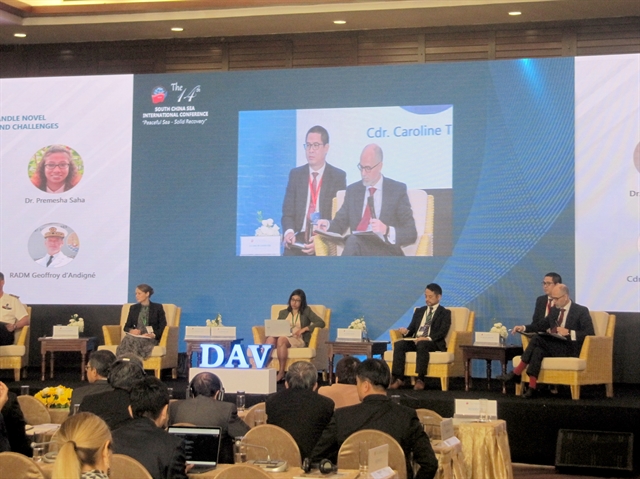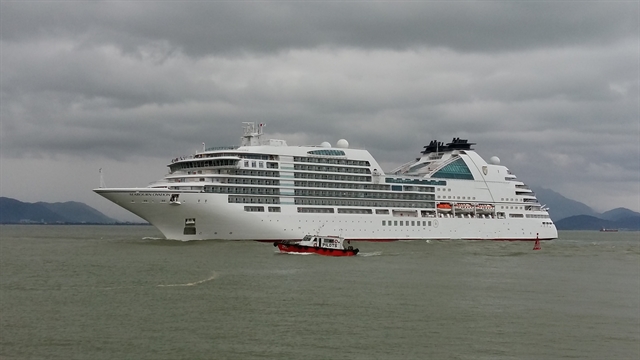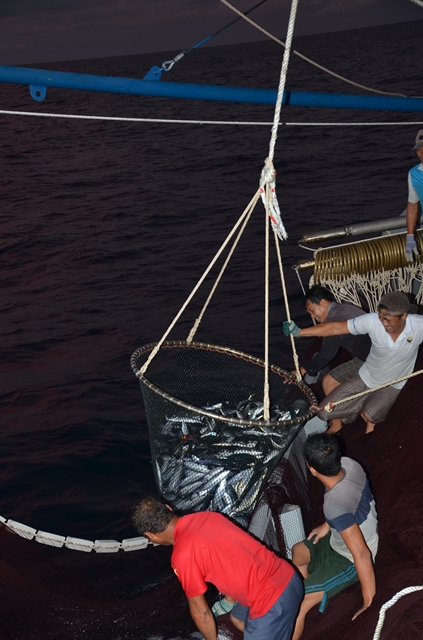 Politics & Law
Politics & Law

 |
| Speakers discuss the blue economy and freedom of navigation at the 14th South China Sea international conference in Đà Nẵng. — VNS Photo Công Thành |
ĐÀ NẴNG — Promoting blue economic cooperation, sustainable trade and supply chain for economic resilience was the last topic discussed on the closing day of the 14th South China Sea international conference, recognising the importance of the new concept for regional peace and prosperity.
This is the reason ASEAN leaders in 2021 issued a Declaration on the Blue Economy and the significance of the oceans and seas as key drivers of economic growth and innovation while highlighting the need to ensure sustainability and rules-based governance.
Dr. Tomasz Lukaszuk from the University of Warsaw, Poland, stressed the cooperation and convergence of interests in the ‘blue economy’ between the European Union and ASEAN.
“The EU countries could invest in the blue economy in Southeast Asia, despite differences in environmental and security conditions," he said.
"The joint efforts would contribute to the centrality of ASEAN in the region and build up its economic competitiveness towards China in the regional comprehensive economic partnership and the South China Sea.”
“The EU introduced integrated maritime policy 12 years ago with the objective of making interconnected sea-based activities more coherent and sustainable development.”
He added the experience of the EU could serve as a model for ASEAN countries, helping them to attain several goals in sustainable development.
 |
| A cruise visits Đà Nẵng's Tiên Sa Port. The central city port is an entrance to the South China Sea (or East Sea) and an important sea route of the global sea transport system. — VNS Photo Công Thành |
Duo Ding from the National Institute for South China Sea Studies, China, said: "The South China Sea is regarded as one of the centres of global marine biodiversity, but in recent years there have been increasing challenges such as overfishing, ocean dumping, and plastic pollution.
“China and ASEAN countries have urgent practical needs to deepen cooperation, and their common interests in this regard far outweigh their differences.”
Professor Robert Beckman from the National University of Singapore, raised concerns about aviation safety, saying it’s critically important to all of the states surrounding the South China Sea as well as to the international community.
“Freedom of overflight is a freedom of the high seas that applies in all airspaces outside the 12 nautical mile territorial sea limits of any land territory that is subject to a claim of sovereignty,” he said.
“I recommend that ASEAN member states and China, as well as other states with interests in the maintenance of freedom of the seas, explore ways and means to minimise threats to international peace and security from the exercise of the freedom of overflight in the South China Sea, including the adoption of rules to enhance communication and prevent misunderstandings that threaten peace and security."
Commander Caroline Tuckett, lead legal adviser in International and Operational Law in the British Royal Navy, said there are two key challenges that many littoral states in the South China Sea face – attempted restrictions on the freedom of navigation and the need to build capacity to increase maritime domain awareness.
 |
| Vietnamese fishermen collect nets in the sea of Paracels of Việt Nam. A busy fishery area for Việt Nam. — Photo courtesy of Lê Chương |
She said: “The freedom of navigation through a particular area can be asserted through the use of an autonomous vessel. Equally, an autonomous vessel or system can be used to increase maritime domain awareness.
"It will outline the practical advantages of the use of this developing technology, including reduced cost and reduced risk to life. It will focus on how, in international law, the use of autonomy is a creditable option for enhancing the legal position of those states who feel threatened by such challenges.”
Emeritus Professor Carlyle Alan Thayer said the Quadrilateral Security Dialogue (Australia, India, Japan and the US) or QUAD could cooperate with partners in the region, support ASEAN unity and centrality, support the practical implementation of ASEAN Outlook on the Indo-Pacific, Indo-Pacific partnership for maritime domain awareness.
The conference, hosted by the Diplomatic Academy of Việt Nam, has drawn more than 470 participants, including online-registered scholars, experts, researchers and speakers from 20 countries.
Former head of the Vietnamese Government's Border Committee, Trần Công Trục, said the conference raised new global issues and challenges that allow partners and countries to share concerns and discuss.
He said it’s an opportunity for states to share their experience in solving problems and disputes with peace talks and negotiations rather than military tensions. — VNS




